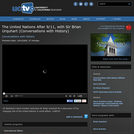
UC Berkeley's Harry Kreisler welcomes Sir Brian Urquhart for a discussion of the changing role of the United Nations in world affairs. (57 min)
- Subject:
- Arts and Humanities
- Material Type:
- Lecture
- Provider:
- UCTV Teacher's Pet
- Date Added:
- 10/05/2008

UC Berkeley's Harry Kreisler welcomes Sir Brian Urquhart for a discussion of the changing role of the United Nations in world affairs. (57 min)
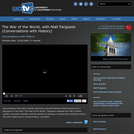
Conversations host Harry Kreisler welcomes Harvard historian Niall Ferguson for a discussion of his book ŇThe War of the World.Ó Ferguson analyzes the role of ethnic conflict, economic volatility, and the decline of empires in making the twentieth century the most violent one in human history. (57 min)
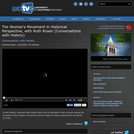
In this edition, historian Ruth Rosen talks with UC Berkeley's Harry Kreisler about the evolution of the women's movement and its impact on future generations of women. (55 min)
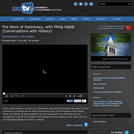
In this 1982 interview, one the U.S. preeminent diplomats Philip Habib talks about his life and times as a foreign service officer and special envoy of the President of the United States. He reflects on great statesmen he has worked with, the difficulties of crisis management, and his involvement in the resolution of the Lebanon crisis, which won him the Presidential Medal of Freedom. (90 min)
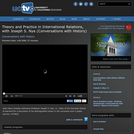
Host Harry Kreisler welcomes Professor Joseph S. Nye, Jr., Dean of the Kennedy School at Harvard for a discussion of his distinguished career in the university and in public service. (57 min)
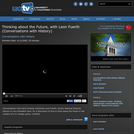
Conversations Host Harry Kreisler welcomes Leon Fuerth, former National Security Advisor to Vice President Gore, for a discussion of how to think about the future in the conduct of U.S. foreign policy. (55 min)
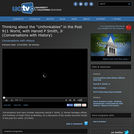
Conversations host Harry Kreisler welcomes Harold P. Smith, Jr, former Pentagon official and Professor of Public Policy at Berkeley, for a discussion of the nuclear terrorism threat in the post 911 world. (58 min)
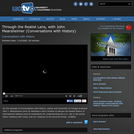
On this episode of Conversations with History, author and University of Chicago professor John J. Mearsheimer joins UC Berkeley's Harry Kreisler to discuss the Realist theory of international relations and its implications for understanding the U.S. role in the world, future relations with China, and our response to the terrorist threat. (58 min)
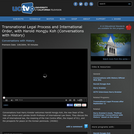
Conversations host Harry Kreisler welcomes Harold Hongju Koh, the new Dean of the Yale Law School and Latrobe Smith Professor of International Law there. They discuss the role of international law, the meaning of the Iran Contra Affair, the impact of 911, and the prospects for peace on the Korean peninsula. (55 min)
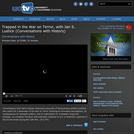
Conversations host Harry Kreisler welcomes University of Pennsylvania political scientist Ian Lustick for a discussion of the War on Terror including its erroneous assumptions, its consequences for domestic politics, and its implications for Al Queda's long term strategy. He compares the Bush administration response to 911 to America's response to the Soviet threat during the Cold War. (57 min)
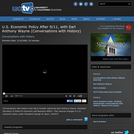
Conversations with History host Harry Kreisler welcomes Earl Anthony Wayne, Assistant Secretary of State for Economic and Business Affairs. They discuss changes in U.S. economic policy under President George W. Bush. (53 min)
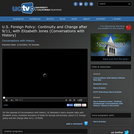
On this episode of Conversations with History, UC Berkeley's Harry Kreisler talks with Elizabeth Jones, Assistant Secretary of State for Europe and Eurasia, about U.S. foreign policy and the change after 9/11. (53 min)
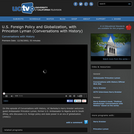
On this episode of Conversations with History, UC BerkeleyŐs Harry Kreisler welcomes guest Ambassador Princeton Lyman, former U.S. Ambassador to Nigeria and to South Africa, who discusses U.S. foreign policy and state power in an era of globalization. 53 min)
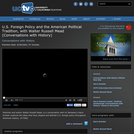
Historian and author Walter Russell Mead, in a conversation with UC Berkeley's Harry Kreisler explores the ideas that have shaped and defined U.S. foreign policy throughout American history. (57 min)
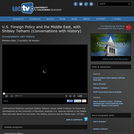
International Relations specialist Shibley Telhami, Anwar Sadat Professor for Peace and Development at the University of Maryland, analyzes U.S. national interest in the Middle East and talks about his new book, The Stakes, America and the Middle East. (58 min)
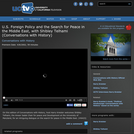
On this edition of Conversations with History, host Harry Kreisler welcomes Shibley Telhami, the Anwar Sadat Chair for peace and Development at the University of Maryland, for an intriguing dialogue on the search for peace in the Middle East. (59 min)
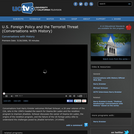
Conversations host Harry Kreisler welcomes Michael Scheuer, a 20 year veteran of the CIA, who in the 1990's headed the search for Osama Bin Laden and the rendition program to imprison jihadists. Scheuer discusses the career of Osama bin Laden, the origins of the rendition program, and the failure of the US foreign policy elite to understand the challenges posed by jihadist terrorism. (55 minutes)
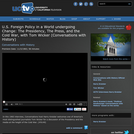
In this 1983 interview, Conversations host Harry Kreisler welcomes one of America's most distinguished journalists Tom Wicker for a discussion of the Presidency and the media at the height of the Cold War. (58 min)
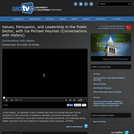
In this edition, UC Berkeley's Harry Kreisler talks with Ira Michael Heyman, former Chancellor of the University of California, Berkeley and former Secretary of the Smithsonian Institution. Chancellor Heyman discusses leadership, the challenges facing higher education and the problems of managing public museums. (58 min)
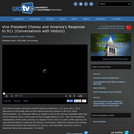
Host Harry Kreisler welcomes Colonel Lawrence Wilkerson, U.S. Army (ret.), for a discussion of the break down of the national security process in the G.W. Bush Administration. Col. Wilkerson offers an insider's view of the Cheney-Rumsfeld cabal that drove American policy in the wake of the Al Qaeda attack on 911. The Vice President’s manipulation of the policy process, he argues, led to a lack of a post conflict planning for Iraq and the failure to abide by the Geneva conventions. Wilkerson analyzes the motives of Cheney/Rumsfeld, their penchant for secrecy, and speculates long term costs to American democracy and power. (58 minutes)